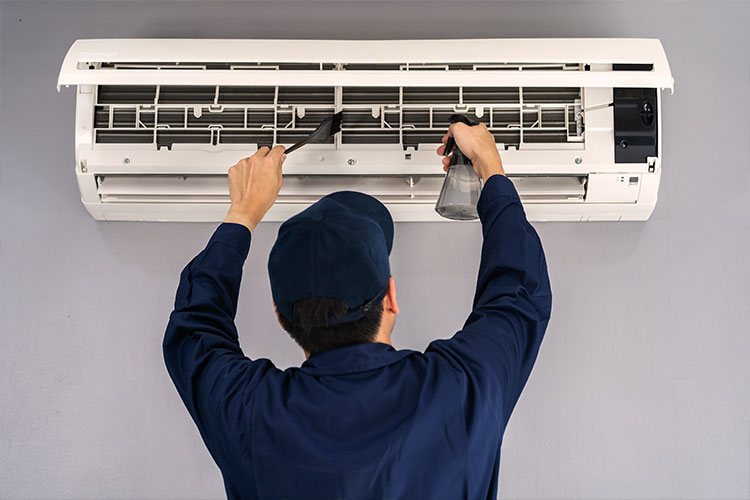Ac A/c Repair Work: Expert Cooling System Restoration Ensures Your Home Stays Comfortable Throughout The Most Popular Days
Common A/c Problems
Have you ever felt that unexpected rush of warm air simply when you anticipated a cool breeze? It's frustrating, isn't it? Many property owners face this predicament, frequently uninformed of what lurks underneath the surface of their a/c system. Let's unravel the secret behind a few of the most frequent problems that require prompt cooling repair.
Why Won't My AC Cool Appropriately?
When your air conditioning unit blows lukewarm air rather of a revitalizing chill, it's a clear sign something's off. A clogged up filter or low refrigerant levels often play the bad guy here. Picture trying to breathe through a headscarf on a hot day-- that's what a dirty filter does to your system. Ever questioned why your energy bills surge when the cooling drops? That's your air conditioner struggling more difficult to compensate for inefficiencies.
Weird Noises and What They Mean
Clicking, buzzing, or rattling sounds aren't just sounds-- they're sobs for assistance. A loose belt or a failing motor may be the offenders. One homeowner stated how a consistent grinding noise turned out to be a damaged compressor, saving them from a total breakdown by acting quickly.
Typical Issues at a Glance
| Symptom | Likely Cause | Quick Repair |
|---|---|---|
| Warm Air | Low refrigerant or dirty filter | Change filter, check refrigerant levels |
| Water Leakages | Blocked drain line or frozen coils | Clear drain line, thaw coils |
| Uncommon Sounds | Loose parts or motor problems | Tighten parts, inspect motor |
Is Your a/c Cycling On and Off?
Brief cycling is more than an inconvenience; it can significantly lower your system's lifespan. This could signify an oversized system or a thermostat glitch. Have you discovered your unit turning on and off like a flickering light? Do not neglect it. It's a subtle hint urging you to employ the specialists before it becomes a costly disaster.
- Unclean filters and coils trigger airflow problems.
- Thermostat malfunctions lead to inconsistent temperatures.
- Electrical concerns can stop your a/c from beginning.
Essential Tools for Air Conditioning Repair Work

Ever stood in front of a sprawling AC system questioning which tool will open the mystery? The right instruments can make all the distinction between a quick repair and an unlimited afternoon of frustration. For instance, a digital manifold gauge set isn't just an expensive gadget; it's the investigator's magnifying glass worldwide of refrigerant pressure. Its precision helps determine leaks or imbalances that a casual glimpse might miss out on.
When dealing with stubborn or rusted parts, a quality tubing cutter is worth its weight in gold. It slices through copper pipelines cleanly, preventing damage that might lead to costly leaks. Have you ever attempted to bend copper tubing by hand just to wind up with kinks? Preventing this requires specialized bending tools created to protect the pipe's stability.
Tools That Experts Swear By
- Vacuum pump: Important for removing moisture and air from the system before charging refrigerant, ensuring ideal effectiveness.
- Leak detector: An essential for capturing undetectable refrigerant leaks that can cause system inefficiency.
- Multimeter: Beyond determining voltage, it's crucial for identifying electrical faults within the air conditioner's control system.
- Fin comb: A little yet magnificent tool that corrects the alignment of bent condenser fins, enhancing air flow and performance.
Pro Tips for Using A/c Repair Work Tools
- Constantly validate your gauge readings versus producer specifications; even seasoned techs double-check to avoid expensive misdiagnoses.
- When using an air pump, ensure all valves and tubes are airtight; a minor leakage can ruin the evacuation procedure.
- Tidy your fin comb routinely. Dust and gunk can cause it to snag, harmful fragile fins further.
In the heat of summer, a malfunctioning compressor or clogged up filter can seem like a ticking time bomb. Equipped with the right tools and knowledge, the repair becomes less of an experience and more of a gratifying puzzle solved. Isn't it curious how a well-calibrated gauge or an easy leak detector can transform the whole result?
Step-by-Step Repair Work Process
Ever discovered how your cooling unit starts to sputter, barely whispering the cool breeze it once provided? The first relocation is an extensive medical diagnosis-- since thinking only lose time and resources. You might start by checking the thermostat settings, however sometimes the genuine perpetrator hides deeper.
1. Initial Evaluation and Diagnostic

Begin by powering off the system to avoid shocks. Open the gain access to panels and aesthetically check for burnt wires, stopped up filters, or ice buildup. A typical oversight is neglecting the condenser coils; dust and dirt here can choke performance. Use a multimeter to check electrical components and confirm if the compressor is receiving power.
2. Recognizing Refrigerant Issues
Does the unit blow warm air? That's frequently an indication of low refrigerant levels or leakages. Experts utilize a manifold gauge set to measure pressure properly. Keep in mind, overcharging or undercharging the system can trigger irreparable damage-- exact measurement is essential.
3. Cleaning and Part Replacement
In some cases, an easy coil cleansing revives the system. Other times, it requires switching out capacitors, website contactors, or fan motors. Replacing these parts includes cautious disassembly and reassembly; avoiding steps can result in further breakdowns.
4. System Testing and Calibration
When repair work are made, switch the system back on and observe its behavior. Step the temperature drop across the evaporator coil-- it must be roughly 15-20 ° F. If not, recalibrate the thermostat or inspect for air flow blockages.
Expert Tips
Air Conditioning Company [:location]Air Conditioning Service Repair [:location]
Air Conditioning Repair Beach [:location]
Air Conditioning Contractor [:location]
Air Conditioning Service [:location]
- Prevent running the compressor without refrigerant-- this burns out the motor rapidly.
- Use a UV dye to track down elusive leaks; they're often concealed in hard-to-reach locations.
- Never ever overlook the drain line-- obstructions here can trigger water damage and system failure.
- Wear insulated gloves when managing capacitors; they maintain charge and can deliver a nasty shock.
Defending Against Unexpected Breakdowns
Have you ever questioned why your a/c unit sputters to a stop right at the peak of summer? The fact is, overlooking regular upkeep typically invites unforeseen failures. Dust, debris, and worn-out components wage a silent war inside your system. Preventive maintenance is the secret weapon-- catching small problems before they spiral out of control.
Professional Tips for Keeping Your Air Conditioning in Top Shape
- Tidy or replace filters monthly: A clogged filter chokes airflow, forcing the system to work overtime and accelerating wear.
- Examine coil fins: Bent fins limit airway, similar to a traffic jam in your cooling system. Use a fin comb to correct them carefully.
- Check refrigerant levels: Low refrigerant can trigger the compressor to get too hot, a precursor to expensive repairs.
- Clear the condensate drain: Obstructions here can result in water damage and mold development, a concealed offender behind sticking around smells.
- Take a look at electrical connections: Loose wiring or corroded terminals typically stimulate periodic failures, a subtle warning indication.
When Was the Last Time You Listened to Your AC?
That faint rattling or uncommon hum might appear minor, but it's a precursor to larger mechanical woes. One summer, a customer discussed a soft buzzing noise. A quick evaluation exposed a loose fan blade-- easy to fix, yet left ignored, it could have shattered the motor. Moments like these highlight the worth of regular checks.
Quick Checklist for Seasonal Prep
| Action | Frequency | Why It Matters |
|---|---|---|
| Filter cleaning/replacement | Every 1 month | Maintains air flow and efficiency |
| Coil and fin assessment | Two times a year | Prevents airflow restrictions |
| Refrigerant level check | Each year | Ensures proper cooling capability |
| Drain line clearing | Every 6 months | Avoids water damage and mold |
| Electrical system assessment | Every year | Avoids unexpected shutdowns |
Pro Pointer: Beyond the Basics
Did you know that lightly lubing the fan motor bearings yearly can extend their life-span? It's a detail often ignored but important. Shading your outdoor unit from direct sunshine can reduce the compressor's work, subtly improving durability. Keep in mind, the health of your air conditioning system is a reflection of the attention you offer it before it screams for assistance.